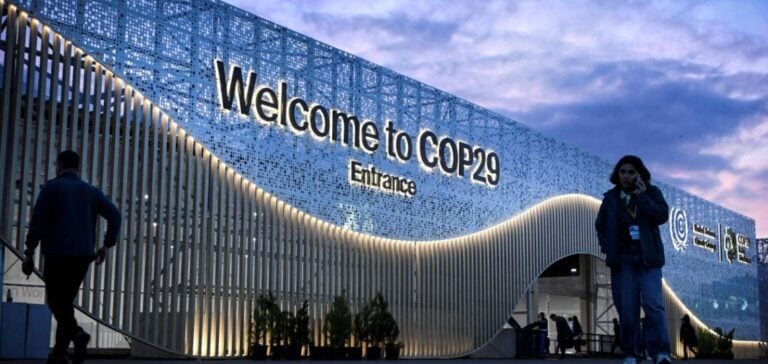The 29th Conference of the Parties (COP29) on climate began in Baku, Azerbaijan, under tense perspectives concerning the allocation of climate aid. Six days after the re-election of Donald Trump in the United States, discussions are focused on the necessary financing to enable developing countries to address growing environmental challenges without resorting to fossil fuels, such as coal or oil.
In his opening speech, Simon Stiell, Executive Director of the UN Climate, emphasized the need to strengthen global cooperation. “It is time to show that global cooperation is up to the moment,” he declared, underlining the scope of this COP. He also reminded participants of the importance of mobilizing significant financial resources to help the most vulnerable countries prepare for increasingly frequent climate impacts, such as heatwaves and floods. COP29, which will run until November 22, is seen as a turning point in determining the annual financing commitments of developed countries.
Massive Financial Stakes
Currently, climate aid allocated by wealthy countries is approximately $116 billion per year, an amount considered insufficient by developing nations. These countries are calling for a significant increase, aiming for commitments in the trillions each year to cover infrastructure needs, adaptation, and resilience against climate upheavals. However, many Western countries, already under financial pressure, view these demands as excessive.
The COP29 President, Moukhtar Babaiev, who is also Azerbaijan’s Minister of Ecology, mentioned “hundreds of billions” in his opening remarks but did not reveal specific commitments. Negotiations began in a tense atmosphere, with delegates working late into the night to try to reach concrete agreements. Many representatives from poorer countries and non-governmental organizations express doubts about the conference’s ability to yield concrete results.
Notable Absence of Certain Leaders
As discussions intensify in Baku, some world leaders have declined to attend the summit. Neither Emmanuel Macron nor Olaf Scholz, leaders of France and Germany respectively, have made the trip for this COP. The meeting will include only a handful of G20 leaders. This lack of support from influential actors reinforces criticisms about the lack of involvement from developed nations.
Brazilian President Lula, host of the next COP in 2025, is also absent. This context makes the negotiations even more challenging, according to Adonia Ayebare, president of the G77+China negotiating bloc. He warned that the two-week discussions could reveal deep divisions between countries regarding the amounts to be allocated and each country’s responsibilities.
Climate Financing Under Debate
The anticipated funding is essential to allow developing nations to adapt to the impacts of climate change. These funds will primarily be used to build resilient infrastructure, such as solar power plants and irrigation systems, construct dikes to protect coasts, and support agriculture in cases of drought. “We must abandon the idea that climate finance is an act of charity,” emphasized Simon Stiell, reminding that this commitment benefits all nations, including the largest ones.
At the same time, developed countries, under economic pressure, are demanding increased participation from major emerging economies like China and Gulf states. These demands face strong opposition from the Chinese side, whose representatives remind that only so-called developed countries, according to the UN definition, are obliged to contribute.






















